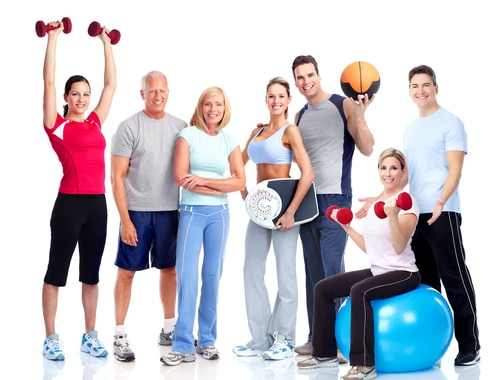
The bad news is basal metabolic rate decreases with age and the decline starts early in life. From birth to the age of 20, your basal metabolic rate declines at a steep rate in both men and women. Around the age of 20, the decrease in metabolic rate becomes less steep until the mid-forties when it starts to decline again. Women have a lower basal metabolic rate at all ages relative to men, but the rate of decline with age is similar.
Why does your metabolism slow with age? Much of the decline can be blamed on the age-related loss of body mass. Men have a higher metabolic rate at all ages compared to women, because they have more metabolically active muscle tissue, while women have a higher percentage of fat. Hormones such as growth hormone, testosterone, estrogen, and thyroid hormone also affect basal metabolic rate, and levels of growth hormone, estrogen and testosterone decrease with age. The gradual decrease in lean body mass and declines in hormone levels account for most of the metabolic slow-down with age.
Is There a Way to Prevent the Age-Related Decrease in Metabolism?
The single best way to keep your metabolism from slowing is to boost lean body mass. Regular resistance training slows down the loss of muscle mass, and research shows that even the elderly can increase the amount of muscle they carry on their frame. The key is to lift weights that are heavy enough to be challenging. A weight should be heavy enough that it can only be lifted around 10 – 15 times before the muscles are completely fatigued.
Heavy resistance training also increases levels of growth hormone and testosterone, both of which boost basal metabolic rate. Resistance training is the single best thing you can do to keep your metabolism from slowing with age. It’s particularly important for women after menopause as hormone levels decline.
How to Keep Your Metabolic Rate Up Even After Your Finish Exercising
The other way to boost basal metabolic rate is to do high-intensity exercise. Doing short periods of intense exercise such as sprints and plyometric exercises tap into anaerobic energy stores. This leads to the build-up of lactic acid, which triggers growth hormone release and causes the body to expend greater amounts of energy during the recovery period. This is what is referred to as the after-burn effect and is what my video AfterBurn is all about.
Even short periods of intense exercise can elevate basal metabolism for hours or even days. The key is to get your heart rate up to at least 85% of your maximum heart rate for short periods of time and then allow it to recover. This is the basis for high-intensity interval training.
Diet Plays a Role Too
To maintain an optimal basal metabolic rate, it’s important to eat an adequate number of calories. Research shows that eating less than 1,000 calories a day can trigger a slow-down in metabolic rate as the body goes into energy conservation mode. Getting enough protein and complex carbs to preserve lean body mass is also critical. Some people advocate eating a high-protein diet to boost metabolism since it takes more energy for the body to digest and use protein. Rather than eating a high-protein diet, it’s better to eat a small amount of lean protein with every meal to keep the metabolism “primed.”
The Bottom Line?
You may not have the same metabolic rate at 50 that you had at 16, but you can prevent much of the weight gain that occurs with age by doing high-intensity exercise and resistance training on a regular basis. Be sure to talk to your doctor before starting a high-intensity exercise program, especially if you’re over the age of 40. Exercise really is the best anti-aging medicine there is.
References:
Hormone Research. Vol. 66, Suppl. 1, 2006.
Exercise Physiology: Energy, Nutrition, and Human Performance. McArdle, Katch, and Katch. 2001.
Related Articles By Cathe:
Is Muscle Loss the Only Reason Your Metabolism Slows with Age?
Are There Legitimate Ways to Boost Your Metabolism?
Can Drinking Coffee Boost Your Metabolism?
Does Strength-Training Really Boost Your Metabolism?
How Does Lack of Sleep Affect Your Metabolism?
Why You Probably Don’t Have a Slow Metabolism after All
Boost Your Metabolism & Break Through Plateaus with PHA Training

